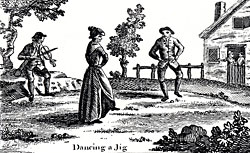Music
Rural Felicity

From “Catchpenny Prints,” Bowles and Carver, London, first published in the late 1780s
In 1767, a song entitled “Rural Felicity,” using an older tune, was included in the pantomime, The Elopement, which was performed at the Drury Lane Theater in London. The tune was known as “Come Haste to the Wedding” or “Haste to the Wedding.” As was often the case, the tune became quite popular after being heard on stage and quickly became a favorite for dances. The song became popular in parlor music repertoires. These words came from song texts collected by Eunice Carew in 1790.
Instrumentation: hammered dulcimer, fiddle, voices
Lyrics
Come haste to the wedding ye friends and ye neighbors,
The lovers their bliss can no longer delay.
Forget all your sorrows your cares and your labors,
And let every heart beat with rapture today.
Come, come one and all, attend to my call,
And revel in pleasures that never can cloy.
Come see rural felicity,
Which love and innocence ever enjoy.
Let envy, let pride, let hate and ambition,
Still crowd to & beat at the breast of the great
To such wretched passions we give no admission,
But leave them alone to the wise ones of state,
We boast of no wealth, but contentment & health,
In mirth & in friends, our moments employ
Come see rural felicity,
Which love and innocence ever enjoy.
With reason we taste of each heart stirring pleasure,
With reason we drink of the full flowing bowl,
Are jocund & gay, but ‘tis all within measure,
For fatal excess will enslave the free soul,
Then come at our bidding to this happy wedding,
No care shall obtrude here, our bliss to annoy
Come see rural felicity,
Which love and innocence ever enjoy.
| Print | Top of Page